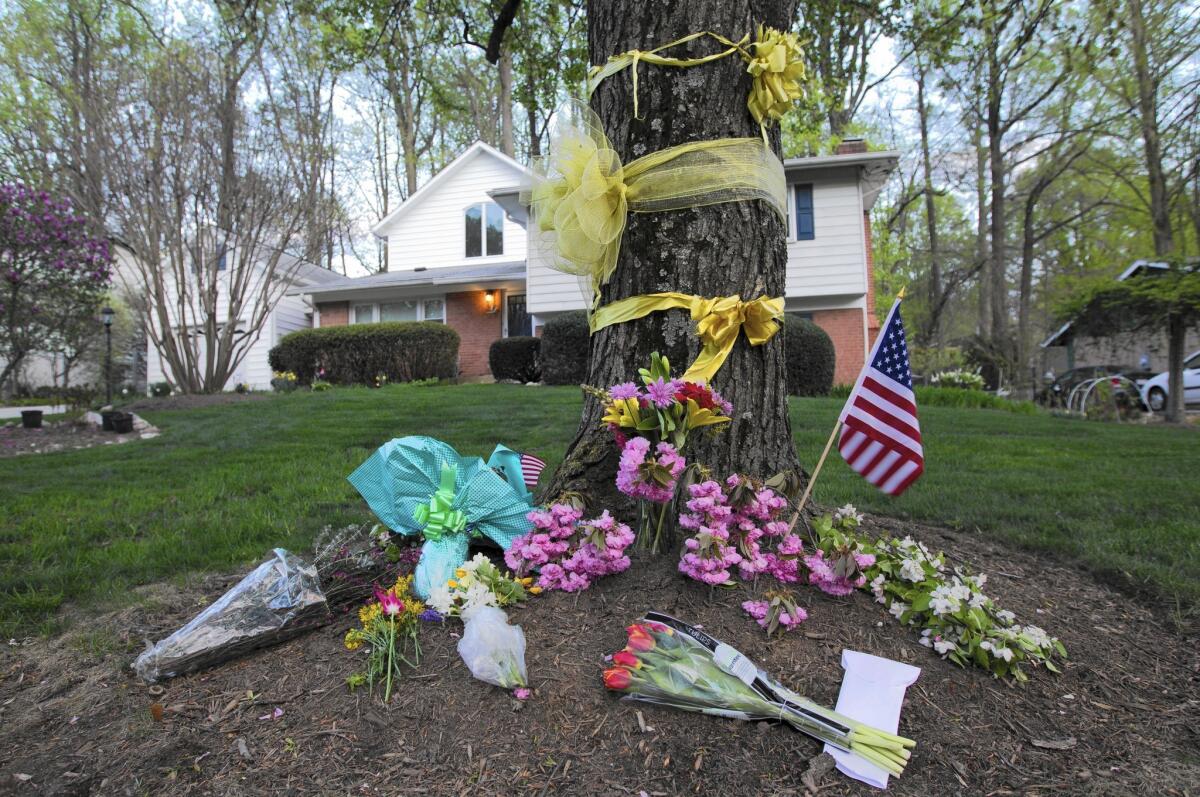U.S. may revamp overseas hostage-rescue program

- Share via
Reporting from Washington — The White House is considering revamping its overseas hostage-rescue program after CIA drone strikes that mistakenly killed an American and an Italian held captive by terrorists in Pakistan, the latest incident to reveal gaps in U.S. counter-terrorism efforts.
A key proposal would create an interagency task force to better coordinate efforts by the FBI, the Pentagon, State Department and intelligence agencies to find and free abduction victims, including a Pennsylvania woman who is believed to be a Taliban captive in Afghanistan.
The proposed shift follows a series of high-profile failures, including a botched U.S. commando raid in December in Yemen during which the captors killed two hostages, an American and a South African. Several attempts to rescue Americans held by Islamic State in Syria also failed, and masked militants beheaded three of them last fall.
Josh Earnest, the White House press secretary, said Friday that the proposed task force also would seek to streamline communication with hostages’ families. A recurrent and bitter complaint by parents and spouses has been that the government moves too slowly and shares too little information.
Some family members issued searing criticism after disclosures Thursday that CIA drone strikes on an Al Qaeda compound Jan. 15 had inadvertently killed Warren Weinstein, a development expert from Maryland, and Giovanni Lo Porto, an Italian aid worker, in the tribal belt of northwestern Pakistan.
A statement released by Weinstein’s widow, Elaine, praised several members of Congress and the FBI for their “relentless efforts to try free my husband.” But she did not hide her frustration.
“Unfortunately, the assistance we received from other elements of the U.S. government was inconsistent and disappointing over the course of 31/2 years” of his captivity, she said. “We hope that my husband’s death and the others who have faced similar tragedies in recent months will finally prompt the U.S. government to take its responsibilities seriously and establish a coordinated and consistent approach to supporting hostages and their families.”
Earnest said the White House aims to work more closely with hostages’ families and is seeking their input on how to do so. Officials have sent letters to 82 families and former hostages, dating to 2001, and have spoken with 22 so far, officials said.
The outreach comes as part of a broader White House review launched in November after family members of several hostages killed in Syria publicly criticized the government’s official refusal to pay ransom or negotiate with terrorists, as some European governments do.
The U.S. has allowed intermediaries, such as the government of Qatar, to negotiate or pay ransom in some cases, however. Qatar’s role was crucial, for example, in arranging the release of Army Sgt. Bowe Bergdahl in a swap for five senior Taliban fighters who were in custody at the U.S. detention center at Guantanamo Bay, Cuba.
But members of Congress, some of whom were sharply critical of the exchange for Bergdahl, have pressed the administration to do more.
Rep. Duncan Hunter (R-Alpine), among the most outspoken critics, has called for appointing a hostage rescue director in the White House to run the government’s efforts.
“The failures in communication and coordination between government agencies tasked with recovering Americans in captivity … is absolutely tragic,” he said in a statement.
Officials said this week that a small number of Americans are being held hostage.
Among them is Caitlin Coleman, a native of York County, Pa., who disappeared with her Canadian husband, Joshua Boyle, west of Kabul, Afghanistan, in late 2012. They have pleaded for U.S. help in videos mailed to their families, and officials say the couple — and apparently their newborn child — appear to be in the custody of Afghan militants.
Though the CIA and other U.S. spy agencies generally take the lead on collecting intelligence on where hostages are being held, the FBI has jurisdiction to investigate crimes against Americans overseas, including kidnapping.
Most overseas hostage cases are managed by FBI agents in the bureau’s field office in Washington and FBI victims assistance specialists and other agents based in FBI regional offices generally take the lead in dealing with families.
The bureau’s behavioral experts, who study hostage situations, give advice on how to deal with kidnappers.
“The FBI is enormously diligent about trying to track down American hostages, but I think an improved interagency process, a higher profile on the issue may be called for,” said Rep. Adam B. Schiff (D-Burbank), the top Democrat on the House Intelligence Committee. “It is regrettably a problem that is not going to go away.”
In a speech Friday to mark the 10th anniversary of creation of the office of the director of national intelligence, Obama said those who work in the 17 U.S. intelligence agencies join him in grieving for Weinstein and Lo Porto.
“We’re going to review what happened,” he said. “We’re going to identify the lessons that can be learned and any improvements and changes that can be made. And I know those of you who are here share our determination to continue doing everything we can to prevent the loss of innocent lives.”
Times staff writers Noah Bierman and Michael A. Memoli contributed to this report.
More to Read
Sign up for Essential California
The most important California stories and recommendations in your inbox every morning.
You may occasionally receive promotional content from the Los Angeles Times.












